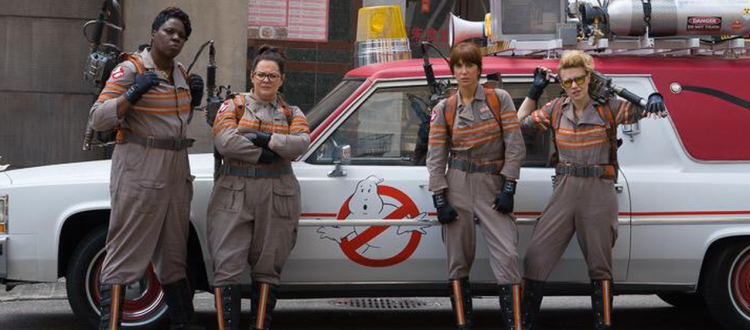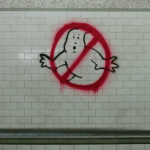Ghostbusters: Reviewed
Whatever intentions Paul Feig had when he agreed to remake Ghostbusters, the end product is both a comedy and a piece of social commentary. The supreme irony is that the people who resent an action-comedy for trending toward the political e.g. internet trolls, MRAs, and other such modern day monsters, are the ones who largely served in elevating the movie to this more thoughtful plane of existence. Thus, there are two distinct ways to examine Mr. Feig’s offering: popcorn versus politics. As a summer-time distraction, Ghostbusters stands head and shoulders above its competition. It’s reasonably paced, acceptably structured, and the writing puts a premium on being clever, though it’s largely coasting on inertia by the end of the movie.
Simultaneously, an incisive wit on the part of the writing invites a certain level of critical engagement with this story. Therein, arguments about Paul Feig and Katie Dippold writing a “fun” movie run headlong into a script that deconstructs the role of women in action movies.
But I suppose I should get the easy stuff out of the way before diving down the movie’s political rabbit hole. Is Paul Feig’s Ghostbusters a worthy successor to Ivan Reitman’s Ghostbusters? Sure. Feig’s movie might not have the mile a minute jokes of its ancestor, but at least none of Feig’s Ghostbusters bring Thorazine as a dating accessory. On the whole, Erin (Kristen Wiig), Abby (Melissa McCarthy), Holtzmann (Kate McKinnon), and Patty (Leslie Jones), are more affable and certainly more relatable to the audience than Peter, Ray, Egon, and Winston. For example, Erin, a sessional instructor at Columbia, gets fired/has her tenure application rejected because she (self) published an embarrassing book on the supernatural. Peter got fired for, presumably, grotesque research ethics violations and being a borderline sex pest.
Feig’s Ghostbusters made me laugh more than it made me roll my eyes. Additionally, it made me believe more than it challenged my suspension of disbelief. In the hands of a lesser director, I’d end the review here and call Ghostbusters a successful, but not great, summer comedy. But Paul Feig is no lesser director, and his tendency toward being clever invites a more careful deconstruction. So, back to politics.
Ghostbusters’ female cast – leading to a film that passes the Bechdel Test with such flying colours as to screw up the curve for every other movie – makes it a political entity. This is no small point of academic wanking, either; Ghostbusters will, in all probability, become the bellwether for Hollywood making more movies for an audience outside the cis-het-male-young demographic. The innate intelligence of this movie, particularly in the face of an active hate campaign trying to destroy it, makes it something worth celebrating and thinking about.
In terms of the writing, Feig and Dippold acknowledge the multiple dimensions of their movie by pairing fart jokes with take-downs of the aforementioned hate campaign as a point of comedic relief. More generally, the movie actively deconstructs the tropes of the action-comedy genre by offering up a Hemsworth brother (the expensive one) as eye candy beyond the confines of the typical male gaze.
Most of the men in this movie, much to the outrage of internet monsters, exist as commentary on the roles usually filled by/foisted upon women e.g. the vapid office assistant or the inherently evil antagonist. In this case the film’s villain is a socially outcast janitor intent on bringing about the supernatural apocalypse. Why do this? Because people have been mean to him, thus justifying any number of horrible actions. He’s every nerd whose has had bad behavior excused because “nerds are socially maladjusted.” Only now this personification of bad behavior is held to account by the very group it tends to marginalize.
But then there’s Patty.
Warning: I am a thirty-four year old white male. I know that my thoughts about depictions of race on screen are of limited value. Though it is cowardly of a critic to frame their informed/”informed” opinions as series of questions, as if to escape ownership of potentially causing offense, I’m going to do so on the grounds that I know I am treading into the danger zone. Hopefully, my questions serve a greater good rather than causing harm.
There’s a line where the ghostbusters introduce themselves as “scientists and Patty.” Patty, a former New York City transit worker, sells her value as a prospective ghostbuster with two assets; first, her knowledge of New York brings “street smarts” (pardon my retching at the use of the term “street smarts”) to the team; second, Patty facilitates the team’s wheels. This is great, except for neither of those things prove to be of value in terms of relevance to the story.
The car is only useful to the narrative after Hotlzmann turns Patty’s uncle’s hearse into the nuclear-powered Ecto-1. Likewise, street smarts never materialize into anything of substantive value. It would be one thing if Patty’s knowledge of the city manifested as a practical counter-point to any potential Ivory Tower naivety in Abby, Erin, or Holtzmann. Instead, engineering and knowledge of the paranormal carry the day. There’s little place in the script for Patty to do anything other than provide mediocre physical comedy and the one-liners seen in the trailers. Notwithstanding a joke about subways smelling of urine, I don’t think Patty utters a joke not seen in the movie’s myriad trailers.
To that end, I question if a movie intent on busting stereotypes isn’t simultaneously deferring to the “sassy black woman” gimmick. Is there a reason why Patty can’t have a Master’s degree in some science and still be working for the MTA? Surely the economy is bad enough to mine a joke or two about an under-employed scientist. Am I out of place for seeing how this movie treats its one person of colour and finding said treatment decidedly typical? Dare I suggest Patty exists to court the “working class” demographic?
These questions shouldn’t suggest I hold Ghostbusters to a dour and pensive standard. But what I see as Patty living firmly inside the box of PoC representation also illustrates how Ghostbusters is concerned with playing it safe. There’s a concerted effort to not hurt feelings, beyond those of MRAs and man-children, or land on the side of anything that comes within a standard deviation of bad taste. Hurrah for not being hurtful, but I raise an eyebrow at safe comedy. Whatever punches the movie throws are decidedly with kid gloves, as not to spoil the chance for a film franchise. Don’t think for a moment that franchise baiting isn’t part of the game.
Feig’s Ghostbusters all but flashes the title of its would-be second chapter before the credits start to roll – Ghostbusters: Answer the Call. The post-credit scene, the ultimate call back to the source material, confirms to even the most cynical eye that some element of the movie was about testing the waters for a multi-movie arc featuring Zuul and Gozer. For me, this would-be hook only reinforces the idea that a skilled editor could have cut down Ghostbusters to an act and a half, allowing Zuul to be the big bad of this film.
I like to imagine there’s a version of the script where just such a thing happened. I wouldn’t be surprised to learn that hate campaign gave Sony cold feet, leaving Feig to prove his concept rather than tell a story. Even returning to Gozer as the future big bad suggests the safety blanket of nostalgia will be underwriting the second Ghostbusters movie. Thus, I put the blame for all this squarely on the shoulders of the internet’s most shitty quarters. You, monsters, are the reason we can’t have nice things.
Alas, knowing where to assign blame for a story failing to live up to its potential doesn’t change the fact that Ghostbusters is clever enough to highlight where it could have been smarter. Setting aside the social commentary, the movie’s comedy is carried almost solely on Kate McKinnon’s shoulders. Wiig and McCarthy’s characters are bland and underused. While the first act delivers any number of solid laughs, the movie slowly runs out of gas as it jogs through the second act and then walks across the finish line. Its final resolution is delivered as quickly and conveniently as its ancestor Ghostbusters crossing the streams at Spook Central. Once the social questions are injected back into the equation, I’m torn between calling Ghostbusters a good movie, or merely good enough in the face of its competition.










